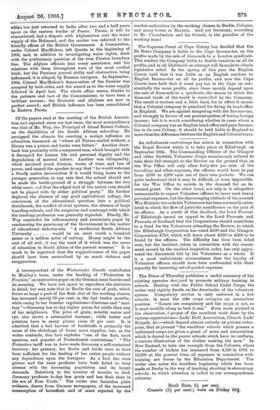• Of the papers read at the meeting of the
British Associa- tion and reported since our last issue, the most extraordinary was that of Mr. Way, the Principal of Graaf Reinet College, on the disabilities of the South African schoolboy. He arraigned the climate for exerting a malign influence on education, inasmuch as "where all Nature smiled without, a library was a prison and books were fetters." Another draw- back was proximity with a conquered race, which brought with it disregard for human life and personal dignity and the degradation of manual labour. Another was bilinguality, which involved much friction, waste of time, and loss of power, and caused the speaker to say that "he would welcome a bloody native insurrection if it would bring home to the younger generation at any rate that the school should not be made the battle-ground of a struggle between the two white races, and that the edged tool of the native vote should not be played with by either political party." He further deplored the absence of any good agricultural college, the conversion of the educational question into a political shuttlecock, the conflict of rival systems, the absence of large boarding-schools, and the suspicion and contempt with which the teaching profession was generally regarded. Finally, Mr. Way concluded his inflammatory and pessimistic paper by condemning the parsimony of the Government in the matter of educational endowments. "A residential South African University would be an asset worth a hundred mines or a million miles of railway. Money might be the root of all evil : it was the want of it which was the curse of education in South Africa at the present moment." It is much to be regretted that the suggestiveness of the paper should have been neutralised by so much violence and exaggeration.


































 Previous page
Previous page